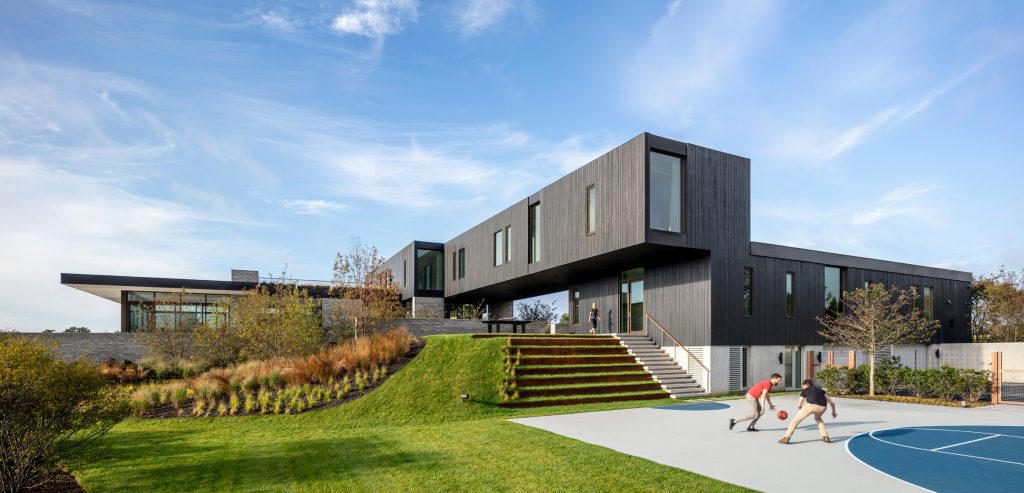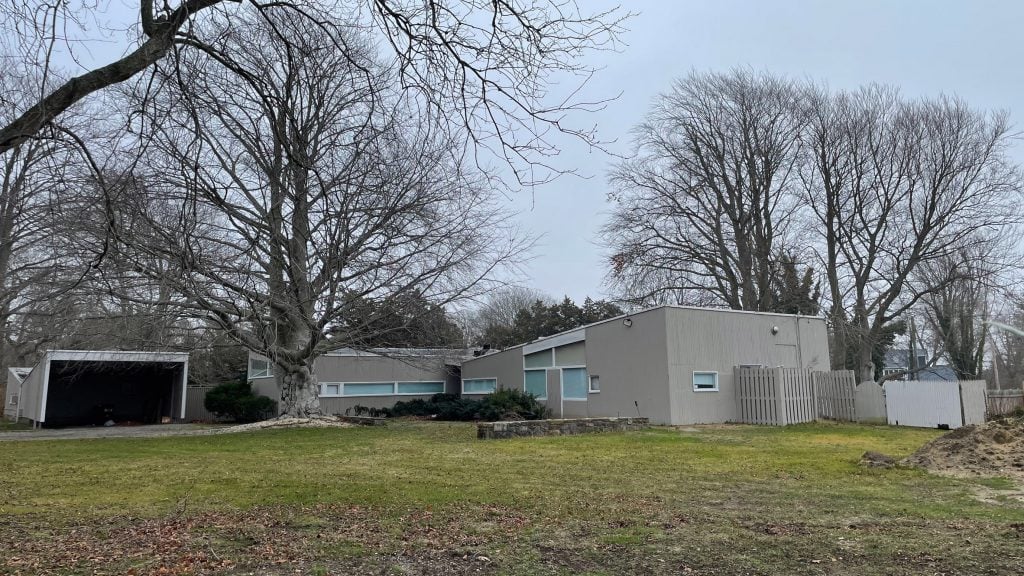2 Likes
#longisland
A+I and Unionworks raise Bridge House to protect sensitive Hamptons environment
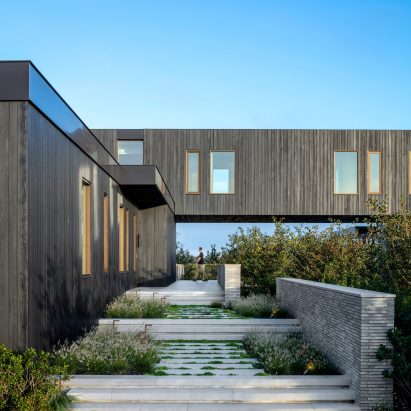
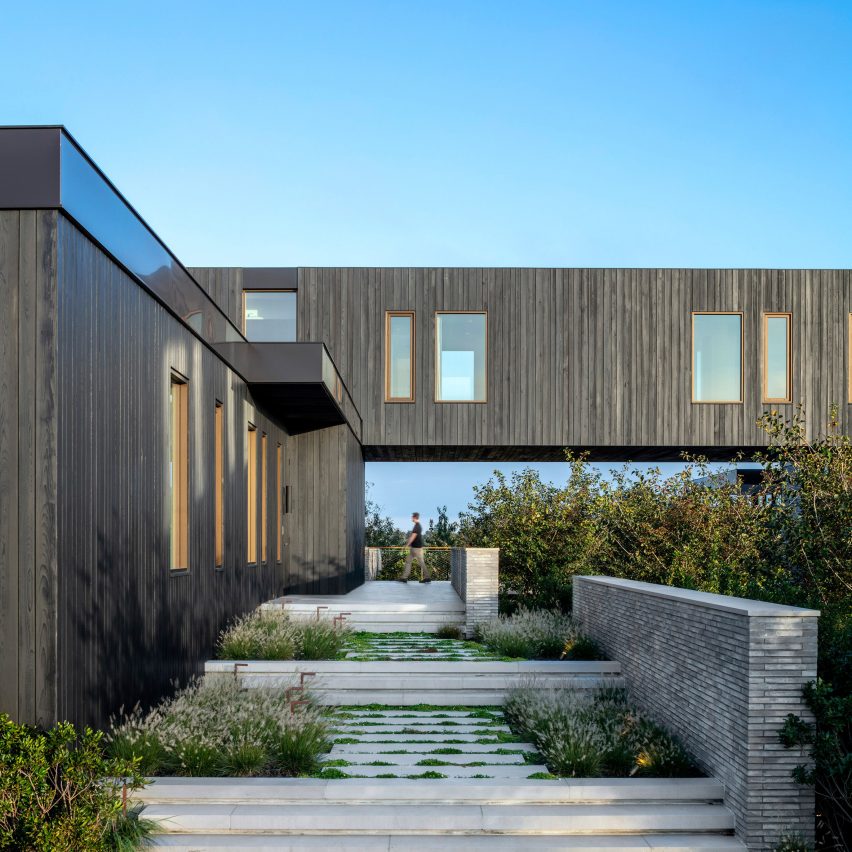
New York studios A+I and Unionworks have completed a house near Long Island's Sagaponack Pond with two volumes connected by an enclosed bridge, allowing the site's native shrubbery to grow beneath.
Bridge House is the first ground-up residential project by A+I, or Architecture+Information, which typically works on office interiors.
The studio collaborated with Unionworks on the expansive private home, located near the Hamptons town of Bridgehampton and totals 12,000 square feet (111 square metres)
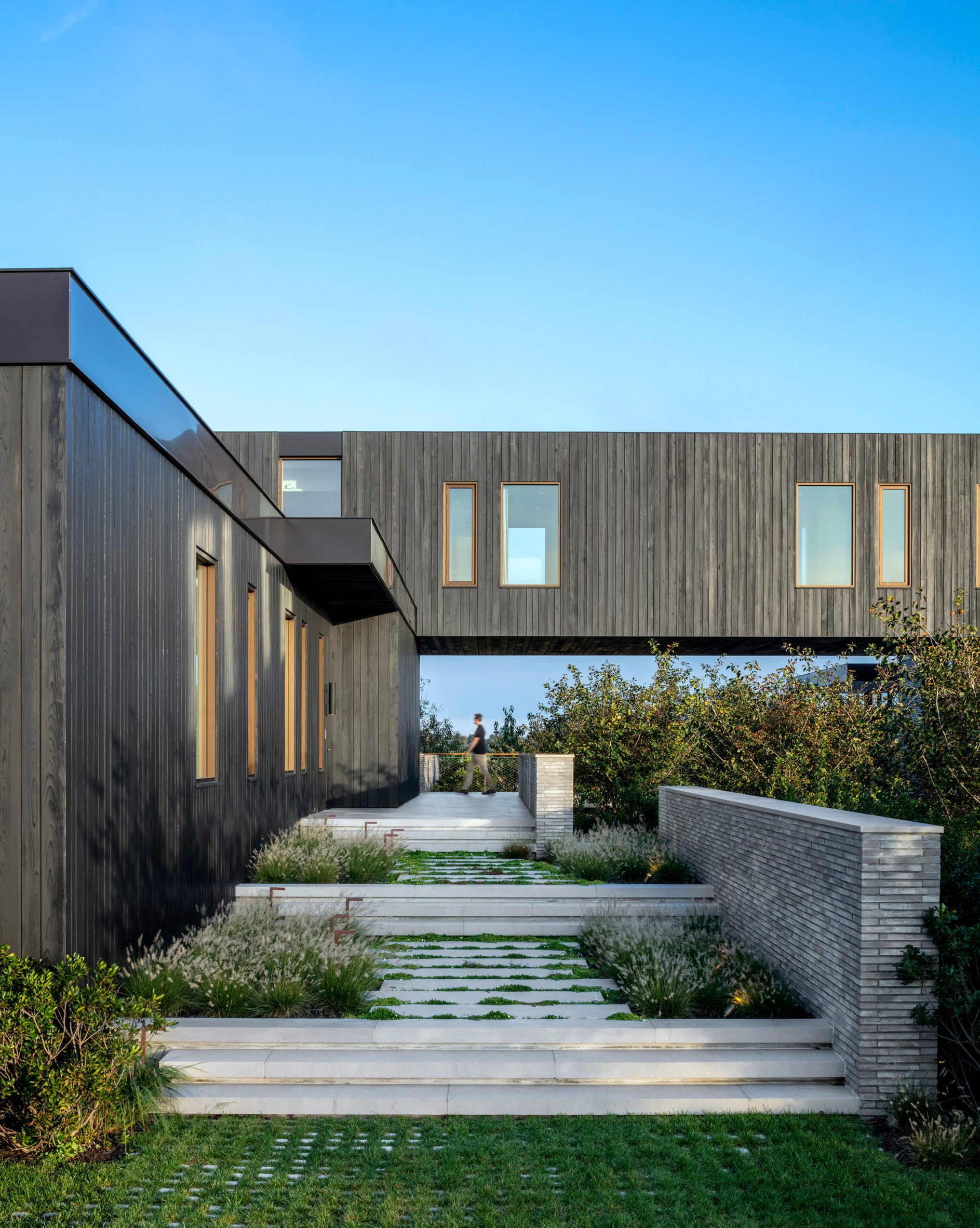 A+I and Unionworks designed Bridge House in Long Island
A+I and Unionworks designed Bridge House in Long Island
Responding to the property's fragile ecosystem, the architects decided to partially raise the house to safeguard against flooding and minimise the impact on the land.
"Because the lowest of the three volumes is elevated 12 feet (3.7 metres) above the ground plain, evoking a bridge, the home seems to float above a bio-swale with native grasses, shrubs and wildflowers created by LaGuardia Design," said the team.
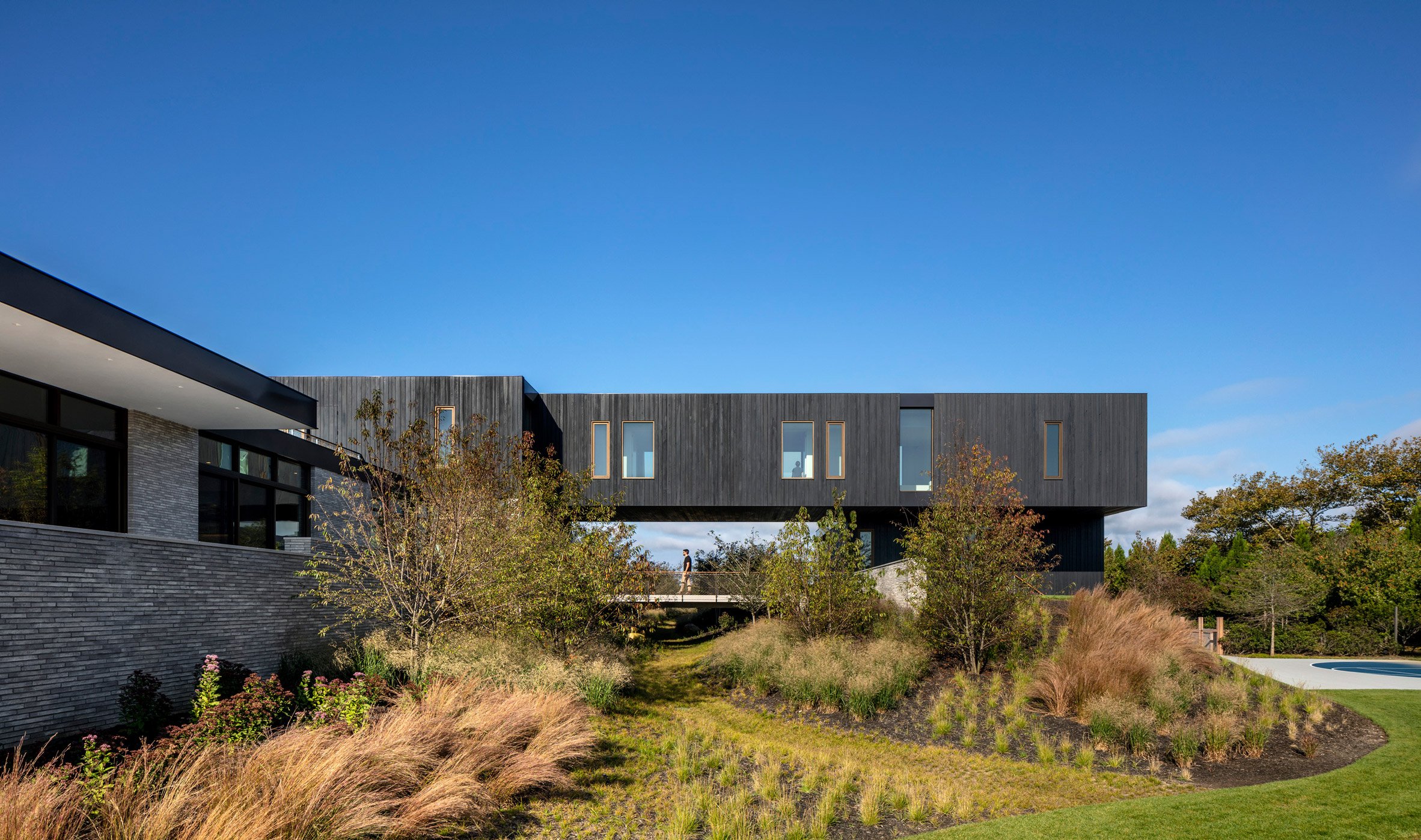 The "bridge" connects two grounded volumes
The "bridge" connects two grounded volumes
"This strategic landscaping allows water during major storms and coastal flooding to pass underneath the structure without harm," they added
Each end of the "bridge" is supported by a grounded volume that contains part of the home's communal areas. The two ground structures are parallel, intersected by the bridge, bringing the total of connected volumes to three.
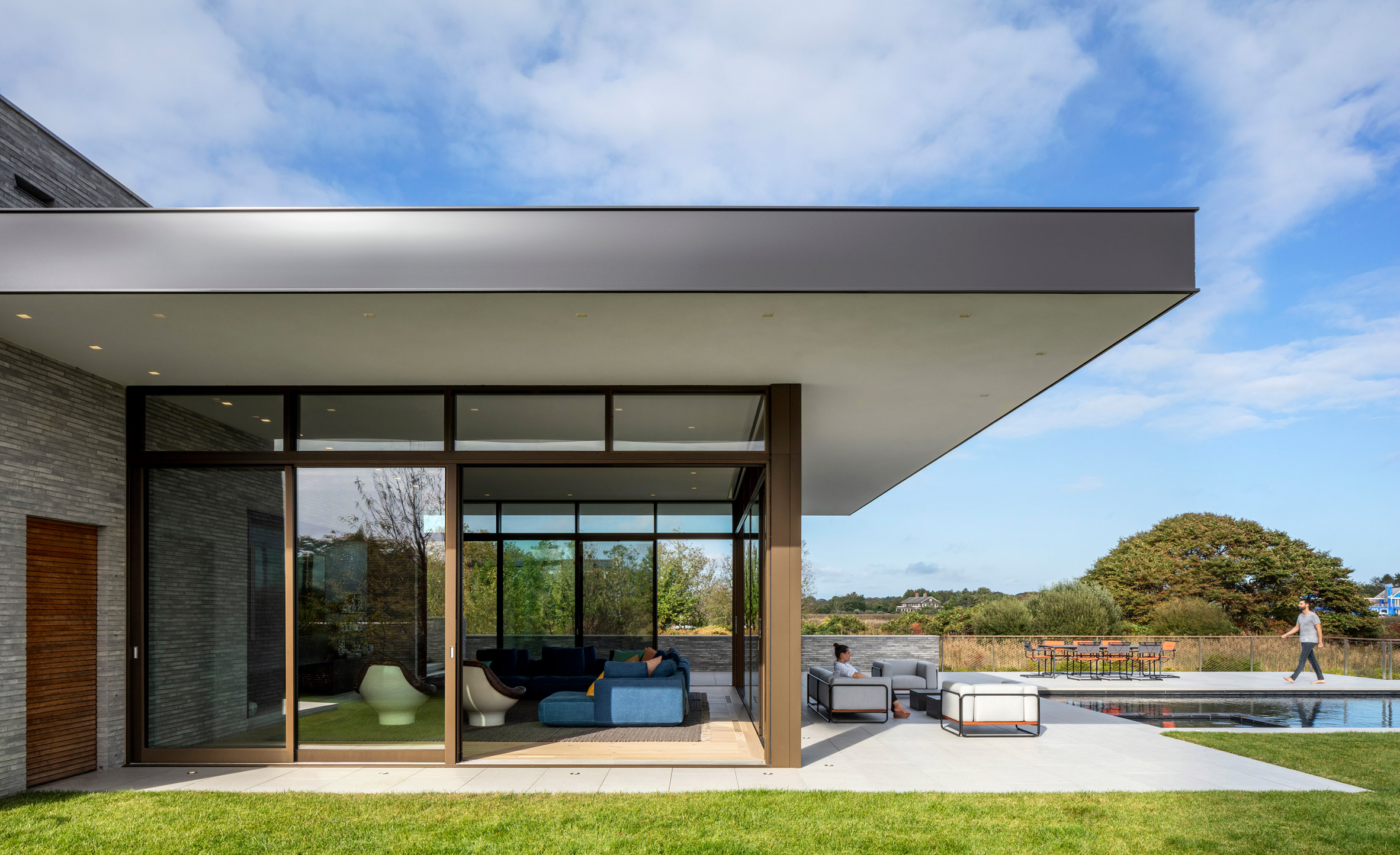 The volumes have plentiful terraces
The volumes have plentiful terraces
These buildings were constructed with slender grey bricks and clad in vertical wooden siding, a choice that the architects describe as "a significant departure from the typical Hamptons shingle style".
"[The property] needed to be unlike any other Hamptons home," said the architects.
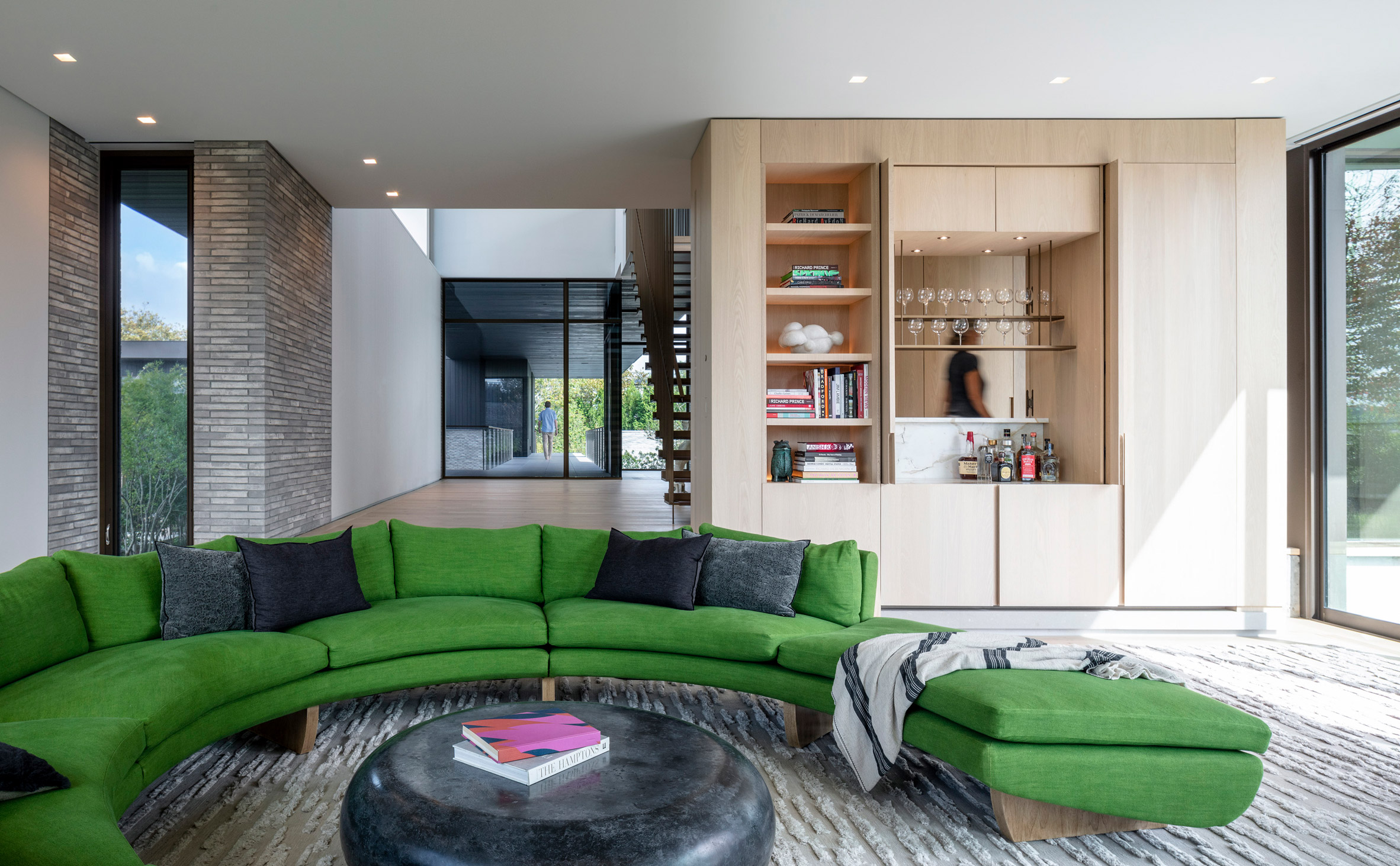 Exposed brick and light wood was placed throughout the interior
Exposed brick and light wood was placed throughout the interior
On the ground floor, the exterior finishes alternate between the exposed grey bricks and floor-to-ceiling windows that slide open, extending the living space into the home's multiple terraces.
"Dark-stained, quarter-sawn wood wraps the facade, lending dimension and character," said the architects.
[ 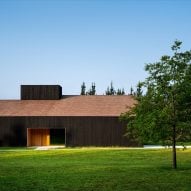
Read:
Caserío Azkarraga is a restaurant and residence wrapped in blackened timber
](https://www.dezeen.com/2021/08/11/caserio-azkarraga-restaurant-residence-blackened-timber-spain/)
The bridge extends over the grounded volumes and becomes the top floor, cantilevering where it meets the grounded volume on the north side.
Stained wooden planks also clad its elevations and underside, which shelters a walkway between the two ends of the building.
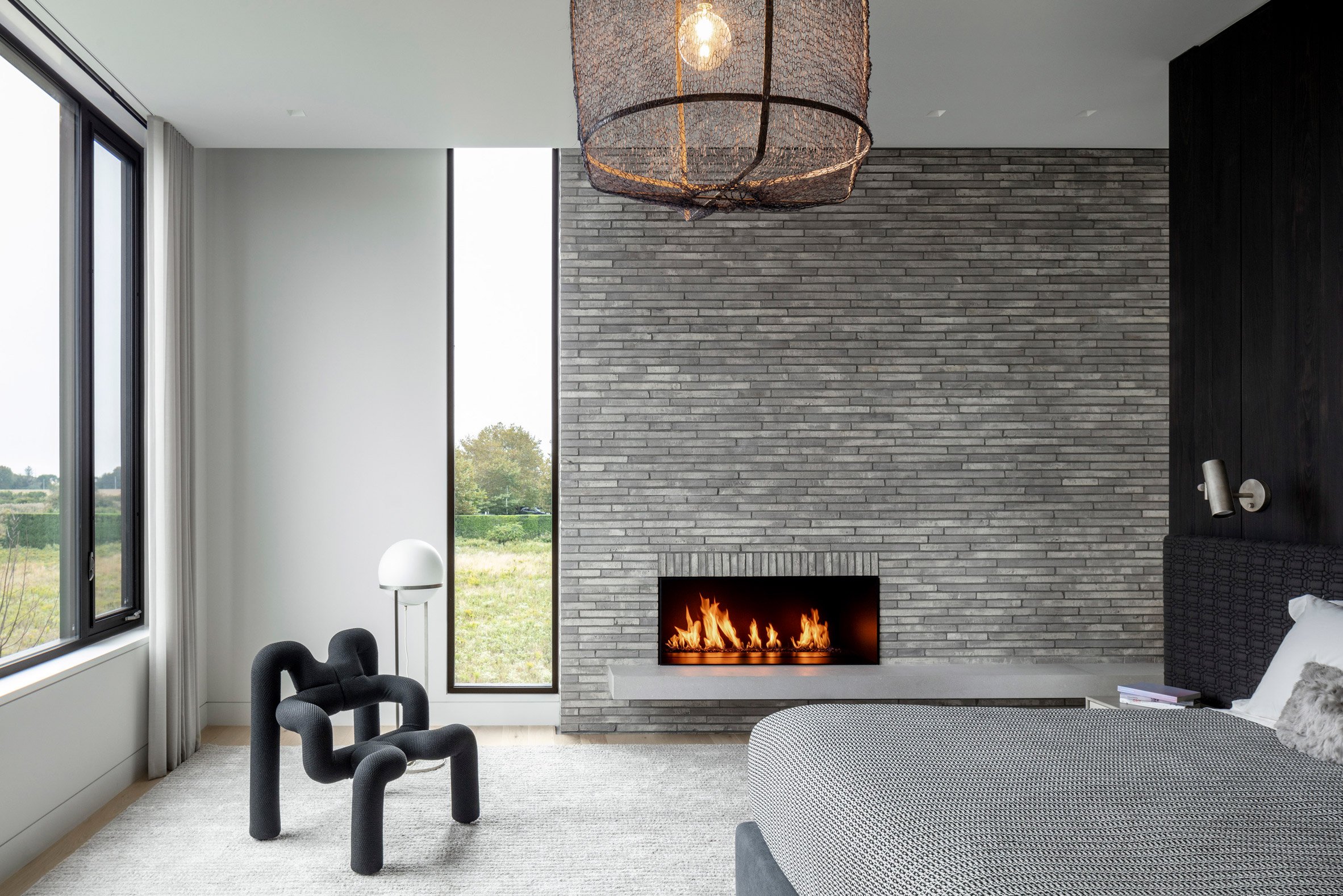 The bridge contains five bedrooms
The bridge contains five bedrooms
The home's interior palette includes accents like bronze kitchen cabinets, which are intended to develop a patina over time.
White oak-paneled walls offers plenty of storage space, and a dramatic, suspended staircase creates a screening effect with the spacing of its slender metal supports.
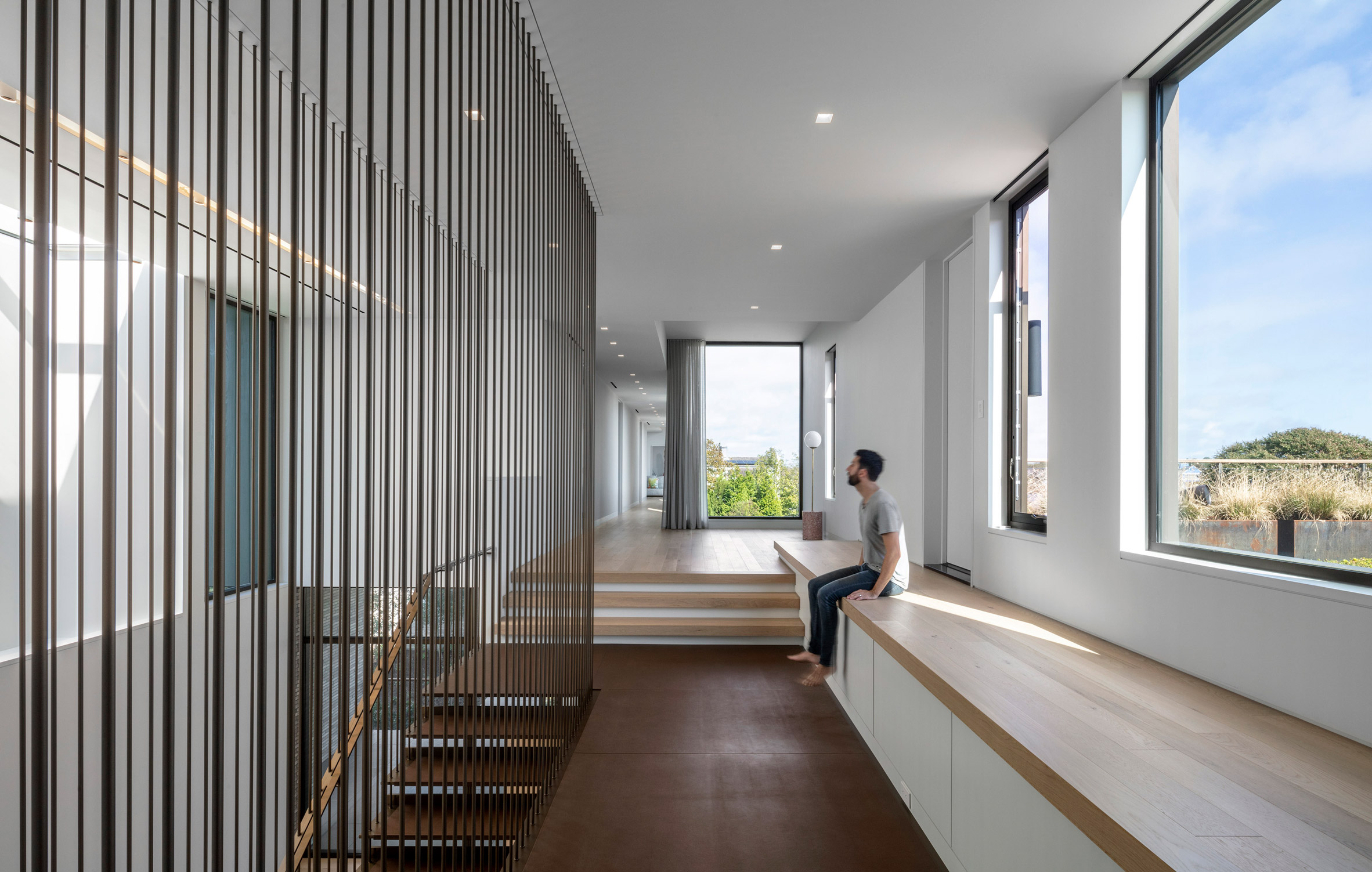 The bridge serves as the top floor
The bridge serves as the top floor
The bridge structure contains five bedrooms, including the primary suite at one end, which opens out to a rooftop terrace. Downstairs, there are four additional bedrooms in one of the wings.
The Hamptons has long served as an escape from New York City, and this stretch of Long Island's southern shore is home to many impressive properties. Others to recently complete include Worrell Yeung's renovation of a 1970s house designed by Charles Gwathmey and a stone-clad residence with a pyramidal roof by Neil Logan.
The photography is byMagda Biernat.
The post A+I and Unionworks raise Bridge House to protect sensitive Hamptons environment appeared first on Dezeen.
#all #architecture #residential #usa #blackenedwood #houses #blackhouses #americanhouses #thehamptons #newyorkhouses #ai #longisland #newyork
"Countries that demolish their past also demolish their future" says commenter
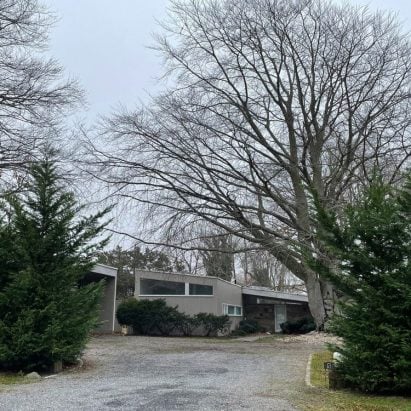
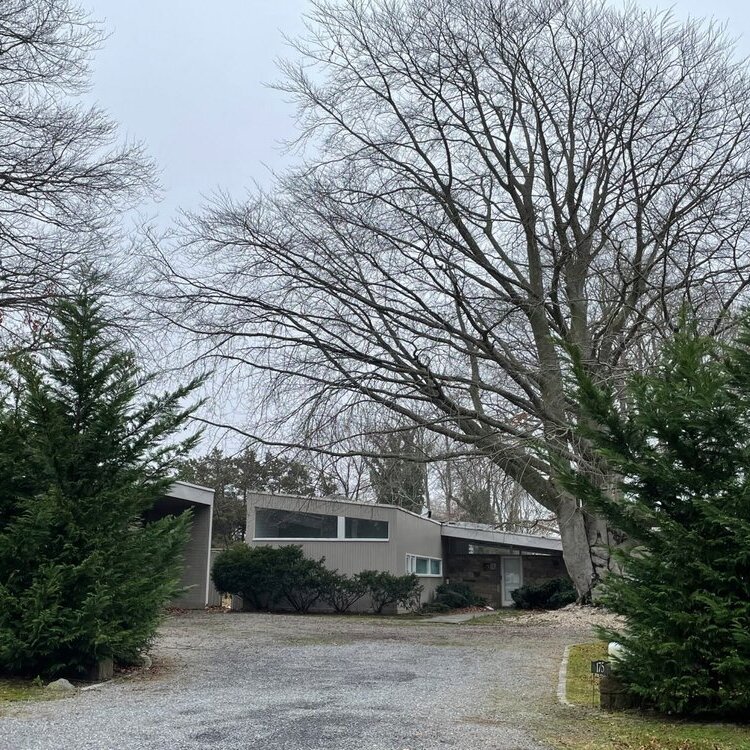
In this week's comments update, readers are debating the demolition of modernist architect Marcel Breuer's Geller I house in Long Island and discussing other top stories.
One of the first homes that Hungarian-American architect Breuer built in the US has been "demolished in the dead of night" to make way for a tennis court.
The home in the village of Lawrence, Long Island, was demolished on 25 January, according to preservation society Docomomo.
"They could have dismantled it and offered it free to a design school"
Readers are divided. "Countries that demolish their past also demolish their future," said Nicholas Tesdorf. "This applies even more to architecture than most categories."
"I wonder what the owners were thinking when they bought the house," added Leo. "'Let's destroy a unique piece of architecture to build a tennis court because there is not a suitable plot for our tennis court anywhere else?'"
"They could have dismantled it and offered it free to a design school to assemble at a new location," continued Tom.
ElephantInTheRoom disagreed: "This house may be historically significant, but it's not one of Brueuer's best examples. And it is ugly. Sorry to call out the obvious. It was not historically protected when the current owners bought it, so they have the right to raze it. Ever heard of private property rights?"
Should the building have been demolished? Join the discussion ›
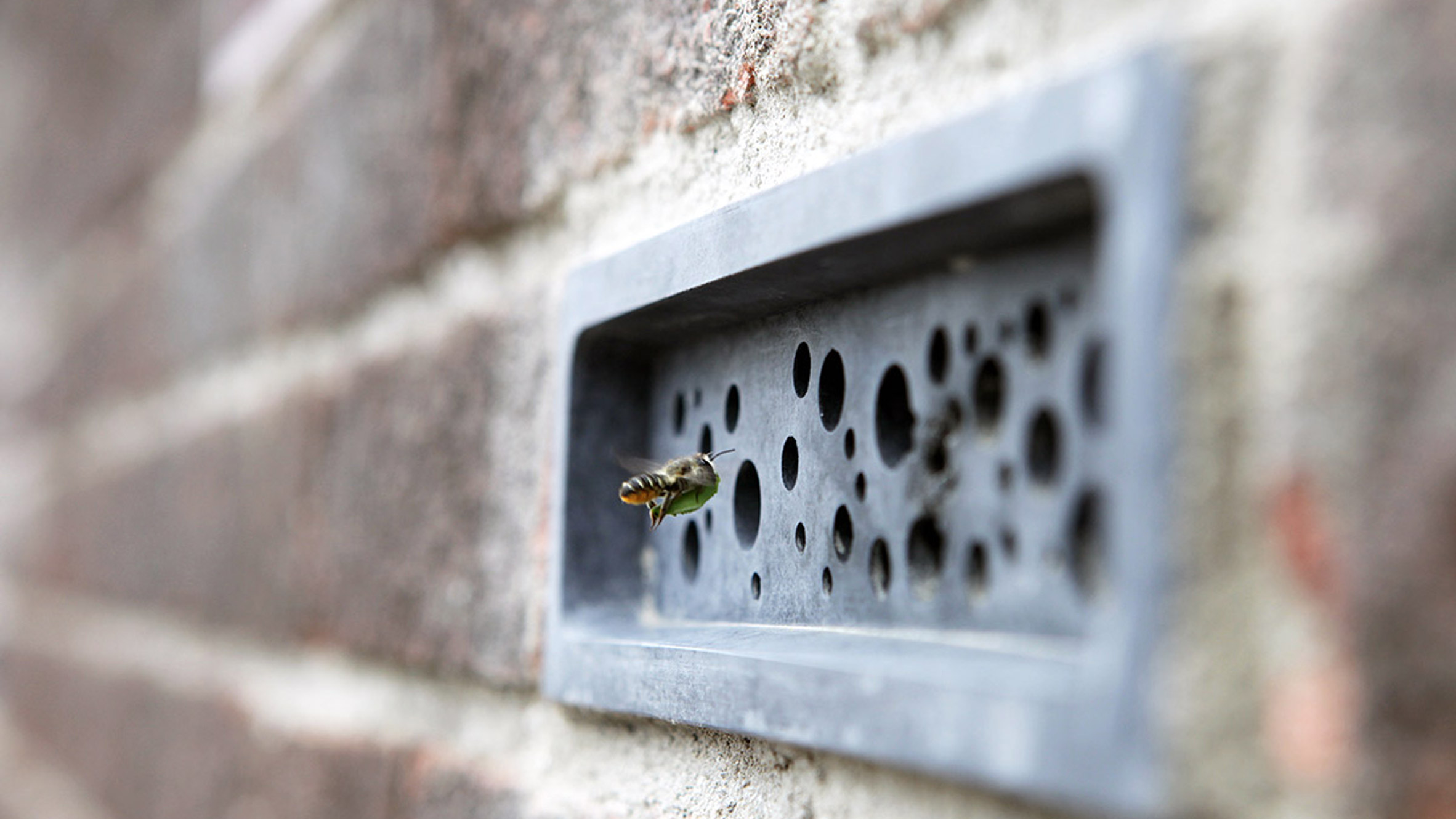 Bee bricks become planning requirement for new buildings in Brighton
Bee bricks become planning requirement for new buildings in Brighton
Commenter thinks bee bricks becoming a planning requirement is "terribly long overdue"
The city of Brighton and Hove in England has introduced a planning law that calls for new buildings to include special bricks that provide nests for solitary bees. Readers are buzzing.
"Man, this seems so terribly long overdue," said Steve Hassler. "What other simple solutions should we be incorporating into our lives to commune more with other lives?"
"We should also consider planting more wildflowers than fancy blossoms," replied Zea Newland. "Wildflowers can be accessed by bees more easily than 'conventionally pretty' flowers that are a lot of work but have little payoff for bees."
"This legislation can only be a good thing," concluded Comments Please. "Small measures like these can add up to make a big difference over time. We've to start being positive about any attempt to give nature a helping hand. After all, we're part of nature too."
Should bee bricks be compulsory for all new buildings? Join the discussion ›
 Berlin citizens propose law to ban cars from city centre
Berlin citizens propose law to ban cars from city centre
Reader calls banning cars from Berlin's city centre "a fantastic idea"
Commenters are showing support for a campaign group named Berlin Autofrei, which has proposed a law to limit private car use within the Ringbahn train line in Berlin.
"Fantastic idea," said Ken Steffes, "and now needs to be done in many more cities around the globe."
Paul Horton continued: "This will have to be normal everywhere eventually. Some are just ahead of the curve! I hope it gets implemented."
"Berlin's not a bad city to cycle in already," replied Ian Byrne. "It's reasonably flat and public transport is reasonably good, so it probably does need some stick as well as carrots to reduce car usage much more. Whether an almost complete ban is the way to go, it's hard to say."
What do you think of the idea to ban cars in Berlin's city centre? Join the discussion ›
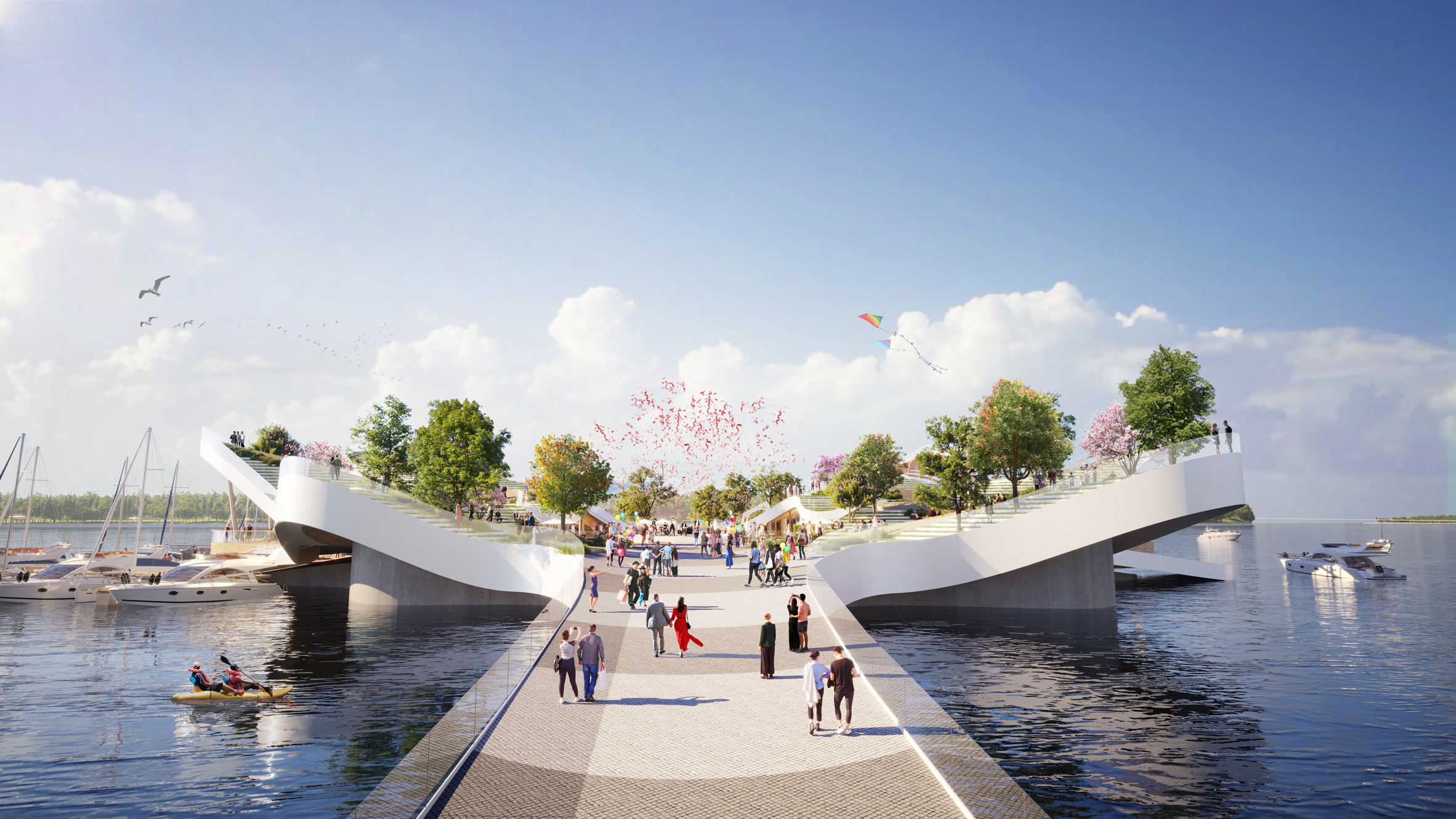 Heatherwick Studio proposes pier with sense of "playful togetherness" for Seoul waterfront
Heatherwick Studio proposes pier with sense of "playful togetherness" for Seoul waterfront
Commenter criticises Heatherwick Studio proposal for being "an utterly pointless waste of resources"
Readers are discussing The Leaf, a multi-level pier proposed by Heatherwick Studio for a site on the Han River near Seoul's Olympic stadium.
"Yes, let's pour tons of concrete into the ocean and give it a whimsical name," said Sharad Majumdar. "What an utterly pointless waste of resources."
竜皐一 agreed: "What's the point of building an artificial forest and grass field on the water where obviously there is active natural vegetation present on the coast? Should it be in the desert, maybe? Still, a bit of a waste of money as we all know Pier is not such a success."
"Same sh*t, different city," concluded Ralph Kent.
Are readers being harsh? Join the discussion ›
Comments update
_Dezeen is the world's most commented architecture and design magazine, receiving thousands of comments each month from readers. Keep up to date on the latest discussions onour comments page._
The post "Countries that demolish their past also demolish their future" says commenter appeared first on Dezeen.
#all #comments #architecture #commentsupdate #marcelbreuer #longisland #newyork
Hey everyone, I’m #newhere. I’m interested in #acooustic_guitar, #adam_duritz, #anxiety, #apple, #beatles, #books, #books-and-literature, #buckowski, #buddhism, #christhile, #chuck_palalnuiuk, #counting-crows, #david_lynch, #depression, #ebooks, #elvis_costello, #encrypt, #encrypt-everything, #encryption, #gpg, #haruki-murakami, #haruki_murakami, #herman-hesse, #john-prine, #kafka, #laurie-anderson, #longisland, #lynch, #magdascabó, #mandolin, #mark-frost, #martin_guitars, #meditation, #mrrogers, #npr, #npr-tiny-desk, #nvc, #patti-smith, #pgp, #post_secret, #spalding-grey, #thic_nhat_hanh, #thile, #tom-waits, #twin-peaks, and #writing.
I'm not really 'new', just migrating.
11 Likes
6 Comments
2 Shares

